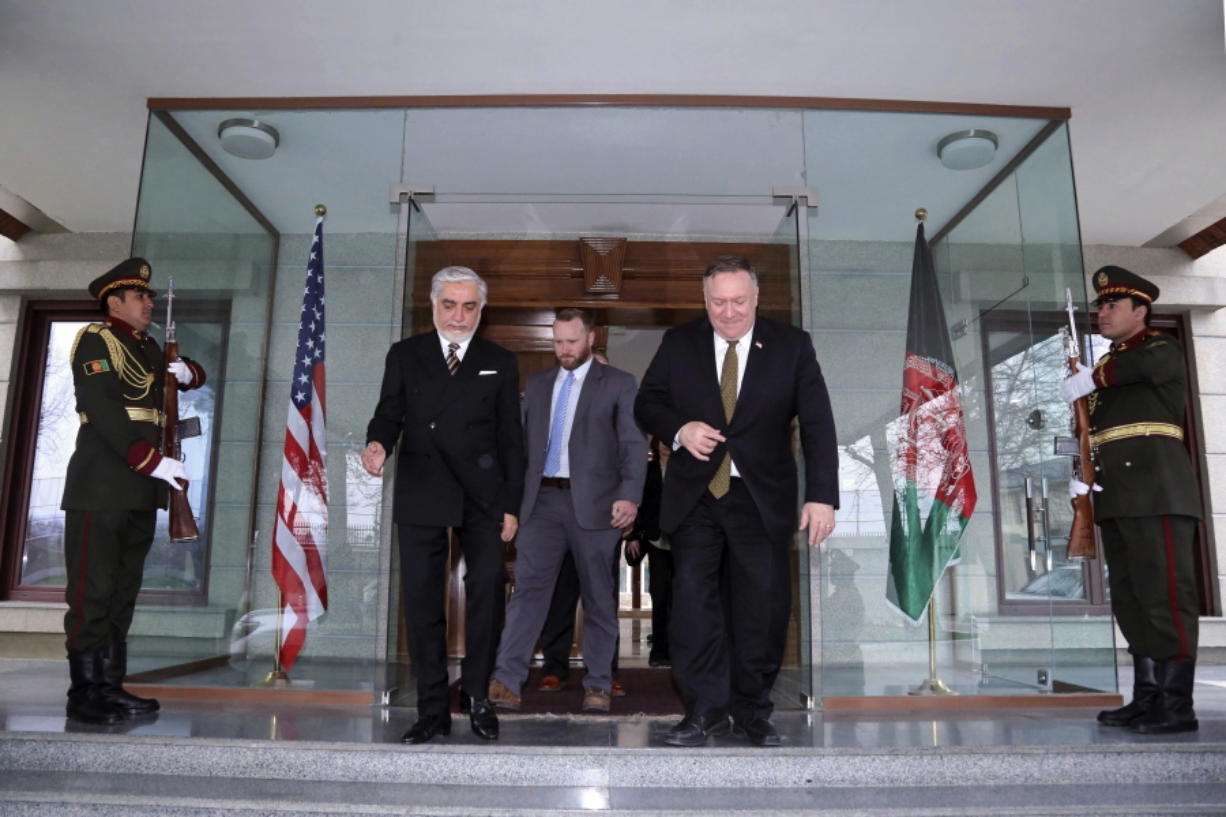Michael Kugelman March 26, 2020

It is hard to overstate the significance of US Secretary of State Mike Pompeo’s surprise visit to Afghanistan on Monday. With his country in the throes of the coronavirus, and no one — not even senior officials — traveling anywhere, Pompeo boarded a plane and took the long flight to Kabul. It was his first announced trip outside America in nearly a month and his first outside Washington since a brief trip to New York in early March.
Pompeo went to Kabul to try to help end an ugly political spat between Afghan President Ashraf Ghani and his main rival, Abdullah Abdullah. Ghani was last month declared the winner of the Afghan presidential election, which was held in September. Abdullah rejected the result, declared himself the winner and followed up on a threat to set up a separate government. He held a presidential inauguration for himself on the same day as Ghani’s.
This crisis has prevented the launch of formal peace talks between the Afghan government and the Taliban. These talks were meant to begin soon after the inking of a Feb. 29 troop withdrawal deal between the US government and the Taliban. But the Ghani-Abdullah spat has prevented the formation of the inclusive negotiating team that is necessary to hold talks with the Taliban. A dispute between Kabul and the Taliban over the release of Taliban prisoners — a stipulation in the US-Taliban deal — is the other major obstacle to launching talks.
Why would Pompeo leave America during its most serious crisis in years and try to end a political spat in a faraway nation? The answer is simple: The Trump administration badly wants a peace deal in Afghanistan — or at least the launch of peace talks.
Washington doesn’t want the agreement that it so painstakingly negotiated with the Taliban to have been in vain. It doesn’t want to face the prospect of initiating a final withdrawal of troops from Afghanistan with no prospects for peace — or even peace talks — in sight. Such a scenario would not only imperil the stability of Afghanistan, it would also give the Trump administration’s critics ample ammunition to accuse it of surrender.
The White House’s fervent desire to see talks begin between the Afghan government and the Taliban isn’t just the explanation for Pompeo’s visit; it is also the reason for the dramatic step Pompeo took immediately after his visit. His trip to Kabul didn’t end the Ghani-Abdullah impasse. After he left Afghanistan — and after a stopover in Doha for a meeting with Taliban officials — his office released a statement announcing that the US government would be cutting $1 billion in assistance to Afghanistan. This is no small sum, especially for Afghanistan, which is heavily dependent on US support.
The aid cut is not meant to be punishment. It is meant to be a form of persuasion. In effect, the Trump administration deployed its most potent tool of leverage — the nuclear option, so to speak — in the hope that this will finally compel Ghani and Abdullah to end their stalemate and enable peace talks to begin. The statement announcing the aid cut suggested that it would be reversed if the crisis was resolved.
The question now is whether or not Washington’s bold move will pay off. Up to now, both Ghani and Abdullah have dug their heels in and been unwilling to compromise. Abdullah, who believes he lost the last three presidential elections because of fraud, including the last two to Ghani, is particularly aggrieved and defiant. It comes down to this: Will the two leaders set aside their differences for the sake of peace, stability and the country’s overall welfare? Or will their jealously guarded political interests — some would call this selfishness — preclude such a concession?
The risk of deploying your most potent tool of leverage is that, if it doesn’t work, you will likely have nothing else in your toolkit, and you will be out of luck. If the Ghani-Abdullah spat continues, US Special Representative for Afghanistan Reconciliation Zalmay Khalilzad, who has essentially been camped out in Kabul over the last few weeks, may make one last-gasp mediation effort. Additionally, Washington may announce additional aid cuts. Or it may resolve to pull more than the 3,000-plus troops that the US-Taliban agreement says must be withdrawn in the coming weeks.
The Trump administration badly wants a peace deal in Afghanistan — or at least the launch of peace talks.
Michael Kugelman
But if none of these options break the Ghani-Abdullah stalemate, the pressure will be on for an American withdrawal in the absence of peace or peace talks — the very option that Washington seeks to avoid.
The window of opportunity for launching peace talks may soon be closing. Coronavirus is rapidly spreading across Afghanistan and an already capacity-constrained Afghan government will need to deepen its focus on curbing it before it gets out of control. This will leave little bandwidth or policy space to redouble efforts to end the Ghani-Abdullah impasse.
It truly is now or never in Afghanistan.
- Michael Kugelman is deputy director of the Asia Program and senior associate for South Asia at the Woodrow Wilson International Center for Scholars. Twitter: @michaelkugelman
The article appeared in the Arab News on March 26, 2020



0 Comments
LEAVE A COMMENT
Your email address will not be published